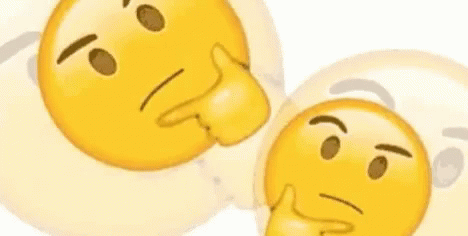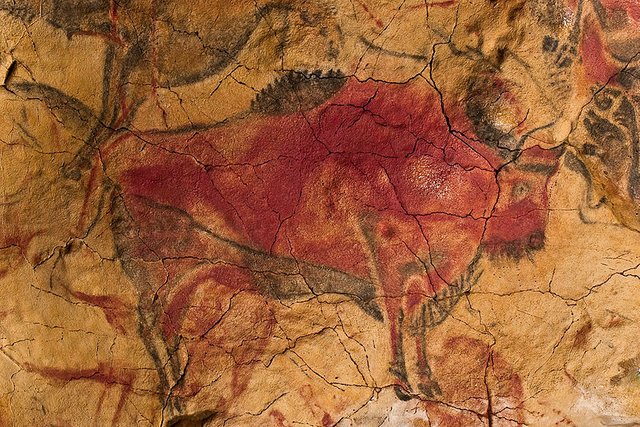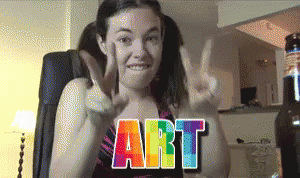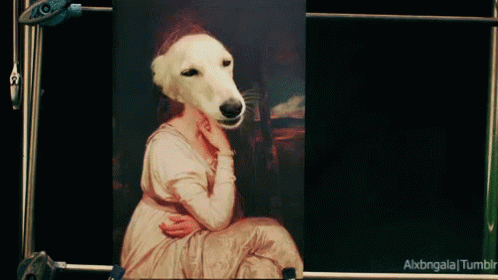WHAT THE F IS ART??? Chapter Two: Art didn't exist
Welcome!
You might be shocked by the title (and you should be), so keep on reading!
On the first chapter we discussed the difficulties that come along when trying to define what art is.
Basically, we realized it's not that easy to point at something and say "yep, this is definitely art" without hesitating.
And this happens because we don't have a concept of art that's clear enough.
We also said we needed a concept that isn't contradictory with art history, and it must include all possible styles (existing and yet to come).
@juliakponsford brilliantly commented:

But has it always been this way?
No, it hasn't.
But not because we actually had such concept of art that respected those considerations...
Because in fact, WE DIDN'T HAVE ONE AT ALL.
Yep, art didn't exist.
...
No, I'm not crazy.
What we call art, even if it's older than your great great great grandfather, didn't exist for itself as art.
It had a different purpose.
Don't get me wrong.
Art as a form of communication has been a part of humanity since always.
But was it just art? Or did it had another job?
How important is art's autonomy for its definition?
Art served as a journal for prehistory communities, who described their lives on the cave's walls.
It was educational for early Christians who hid their cult in catacombs.
For Greeks, Romans, Native cultures, Egyptians, Renaissance people, and many others, art is used as a sign of prestige.
That hasn't changed much, has it?
Art is still used for decoration only and associated with elites.
But it doesn't sound good to say art depends on such thing as aesthetics or prestige...
As long as art is considered from a different perspective than the concept of art itself, such as "art is decoration for a living room", or "a purchased product" then art is not being considered as art.
So when did the concept of art actually born?
Well, is there such a thing as a concept of art?
Find out in the next chapter!
Thank you for reading!
Btw, in each post I'm going to include the best comments, so go ahead!
Add some value to this post with your opinions!
If I select you, in addition to promoting, I'll resteem one of your latest posts!
WHAT THE F IS ART is a series of posts by @sarahart that include:
Chapter 1: Introduction
Chapter 2: Art didn't exist
Chapter 3: Art b.D. and a.D. (Before Duchamp and after Duchamp)
Chapter 4: Is art dead? (Thoughts on Contemporary Art)
Chapter 5: Conclusions (If we ever reach one... Mmm, maybe that's the point!)




I agree with the point that before there was no such thing as a concept to art since the whole thing kept developing so constantly, and now a days, even though everything is inspired by something prior, I still believe we should´t close ourselves to just a concept, must believe more than anything in an idea of art. It is such a complex thing that every mind would consider something different to be worthy of the title.
Wow, great comment @anacristinacaru! Thank you!
An idea of art, that's it. You spoiled the next chapters, lol. But still, there's a lot we need to consider before getting there, there must be something every work of art has in common that doesn't depend on different opinions or taste.
looking forward to reading the next ones!
I'll say a thing, among others I could have told :
Being in our minds, art is fragile. So it has to be established on various supports, such a canvas.
But a canvas is fragile. So it has to be established on or with other supports, or with other functions : financial value, prestige, museums, decoration etc...
Perhaps that's something unevitable.
And that's why your post aim at separating what's art and what's only its various "supports".
@christower, thanks for commenting again! My post aims to art's function. What works of art are used for. I wouldn't call it a "support". Still, I think you get the point, when a painting (for example) is purchased and hang on a living room it may not stop being art, but that wasn't originally its purpose. Art is not meant to be useful.
I was wondering when the second one in this series was coming! =)
I've been thinking about it and perhaps a great definition of art is something that someone (anyone) values for reasons beyond practical use? With this thought, one could consider two layers... The first would be absolutely anything that makes you feel any kind of attachment to it. An old teddy bear, for example. The teddy bear may have been mass produced in the 1920s, but now it's an heirloom that used to belong to your grandmother. It is unintentional art.
The second layer would be... Someone paints you, holding the teddy bear. They contrast your youth with its age.
Or someone searches for old teddy bears left in attics, makes a display with them... Photographs them...
This would be intentional art.
Anyway! ;P You haven't been on steemit for a while. Been busy? I've missed your upvotes and comments on my art ;P ... lol.
Hi, @mandelsage! You're right, I'm so sorry. I've been busy with the semester and blah blah blah. I'm going to pass by your blog to see what you've been up to. (:
Anyway, great comment, thanks a lot! It makes me happy to read that you've been thinking about this. And I think you've reached an important point: art has no practical use, it exists to feed our spirits and our minds. But that's just an aspect of art, there are still some things to clear up. That definition looks like the definition of beauty according to Kant, do you remember that post?
The second example, that you call intentional art, is closer to a definition of art. Don't worry, I understand your point perfectly with the unintentional art, but I just think that the object's value it's different from what makes that object "art". It's too personal.
But enough for now, I have to save some thoughts for the next chapters! These kind of comments are going to leave me dry! (Just kidding, I love it!)
We wish to see you back one day !
Don't mind too much of the commentaries, perhaps, not to disturb you too much of that project that was pleasant and interesting ; these 5 chapters on art !
(I'm presently reading on Duchamp - a looong text)